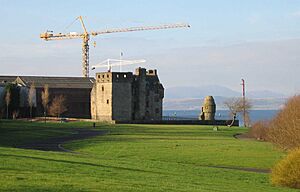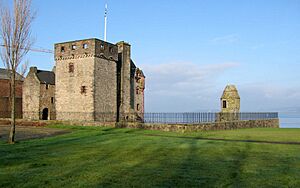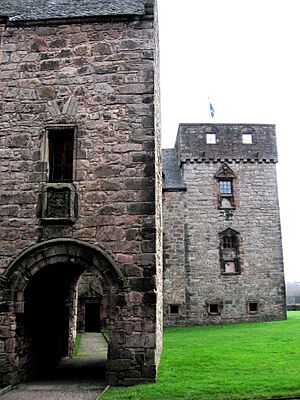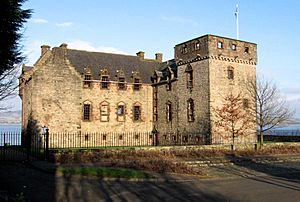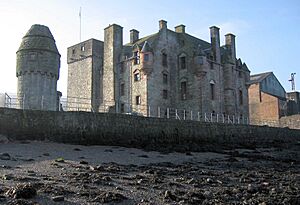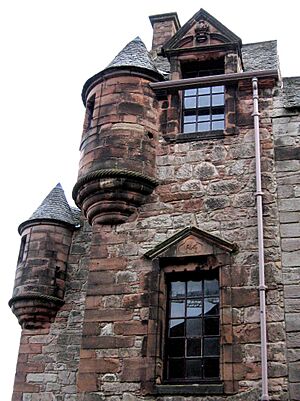Newark Castle, Port Glasgow facts for kids
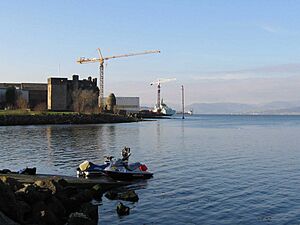
Newark Castle is a really old and well-kept castle in Port Glasgow, Scotland. It sits right on the south shore of the River Clyde, where the river starts to get narrower. This spot was important for a long time because it was hard for big ships to sail further up the river due to sandbanks. So, ships would unload their goods here, and that's how Port Glasgow grew up around the castle.
Later, people learned how to dig out the river (called dredging). This made it possible for ships to sail all the way to Glasgow. Because of this, Port Glasgow became a place where ships were built, and soon, shipyards surrounded the castle. Today, Ferguson Shipbuilders is the last shipyard left near the castle. Many of the old shipyards to the east were removed around the 1980s. Now, there are nice open areas and a new road that give great views of the castle and the Clyde.
History of Newark Castle
The castle was built in 1478 by a man named George Maxwell. He had just inherited the land known as the Barony of Finlanstone. The first castle was a simple tower house inside a walled area called a barmkin. You entered through a big gatehouse. Only a small part of the original outer wall, from one of its corner towers, is still standing. People think there would have been a main hall and other buildings inside the walls, like a place to bake bread or brew drinks.
The Renaissance Mansion
In the late 1500s, Sir Patrick Maxwell inherited the castle. He was a powerful friend of King James VI of Scotland. In 1597, Sir Patrick made the castle much bigger. He built a new section on the north side, which was a fancy three-story Renaissance mansion. At this time, most of the old barmkin wall was taken down. Only the northeast tower was kept and turned into a dovecote, which is a home for pigeons.
The main part of the new mansion had cellars with small windows at the bottom. Above that was a large hall with big windows, and then more rooms on the top floor. An east wing was added, with the main entrance door close to the new building. This wing connected the new mansion to the original tower house, which was updated. A short west wing also connected to the old gatehouse. The mansion has cool features like staircases that stick out from the walls and fancy turrets (small towers) on the corners.
In 1668, the city of Glasgow bought land around Newark Castle from Sir George Maxwell, who owned it then. They developed the area into a busy port and called it "Port Glasgow". The last Maxwell owner died in 1694, and after that, the castle had many different owners who didn't live there. One early person who rented the castle was John Orr, a rope maker. He also bought and sold wild animals like big cats and bears from ships visiting the Clyde. He often kept these animals in the castle cellars! Later, another renter, Charles Williamson, blocked off parts of the castle to stop a joiner (a woodworker) from stealing fruit stored in the cellars.
Visiting Newark Castle
Newark Castle became a special place cared for by the state in 1909. Today, it is looked after by Historic Environment Scotland and is open to visitors. It has great facilities for people to come and explore its history.
See also
- Doocot (images of Newark Castle doocot)
- Skelmorlie Castle
- List of Category A listed buildings in Inverclyde
- List of listed buildings in Port Glasgow, Inverclyde
 | Mary Eliza Mahoney |
 | Susie King Taylor |
 | Ida Gray |
 | Eliza Ann Grier |


